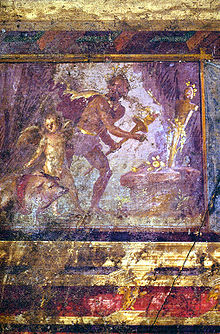Priapus

Priapus ( Greek Πρίαπος , Latinized Priapus ), son of Dionysus and Aphrodite , in which was Greek mythology, a god of fertility . He appeared as a protector of cattle (sheep and goats), bees, fish and fruits.
myth
According to Greek mythology , Aphrodite had a love affair with Dionysus . She gave birth to Priapus in the coastal region of Abarnis near Lampsakos . Because of Hera's magical powers , he was misshapen. Aphrodite therefore denied her son and abandoned him.
A local cult , initially limited to Lampsakos and the Dardanelles , then spread over the Greek and soon over the Roman world: the first fruits of the field and garden were offered to him. Priapus' statues, equipped with a huge phallus , mostly made of wood and painted red, were supposed to guarantee a rich harvest in orchards and vineyards as a lucky charm. You should act like a scarecrow and scare away thieves.
Poems about God are called Priapeen . In the Latin literature that became known Satire I, 8 of Horace . Two Priapus fragments are incorrectly ascribed to Catullus ; the two Priapeen of Tibull not from his hand.
The Roman counterpart to Priapus is Mutunus Tutunus .
If a man suffers from a permanent, permanent erection of his penis, this clinical picture is called medically today priapism , named after Priapus. The Priapus worms were also named after Priapus.
See also
literature
in alphabetical order by authors / editors
- Hans Herter : Priapus. In: The Little Pauly (KlP). Volume 4, Stuttgart 1972, column 1130 f.
- Hans Herter: Priapus. In: Paulys Realencyclopadie der classischen Antiquity Science (RE). Volume XXII, 2, Stuttgart 1954, Sp. 1914-1942.
- Hans Herter: De Priapo . Walter de Gruyter publishing house, Berlin 1932.
- Otto Jessen: Priapus . In: Wilhelm Heinrich Roscher (Hrsg.): Detailed lexicon of Greek and Roman mythology . Volume 3.2, Leipzig 1909, Col. 2967-2990 ( digitized version ).
- Wolf-Rüdiger Megow: Priapus . In: Lexicon Iconographicum Mythologiae Classicae (LIMC). Volume VIII, Zurich / Munich 1997, pp. 1028-1044.
- Herbert Jennings Rose : Greek Mythology: A Manual . CH Beck, Munich 2011 ISBN 978-3406629013
- Susanne Schindler-Reinisch: Pleasure roots: Plants from the gardens of Priapus. A cultural-historical consideration of the love magic plants in Germany . Wernersche Verlagsgesellschaft, Worms 2007, ISBN 978-3-88462-243-8
Web links
- Literature by and about Priapus in the catalog of the German National Library
- Priapus in the Theoi Project
Individual evidence
- ↑ Scholion zu Apollonios von Rhodos , Argonautika 1, 932 f .; Etymologicum magnum , s. Abarnida ; Stephanos of Byzantium , s. Abarnos .
